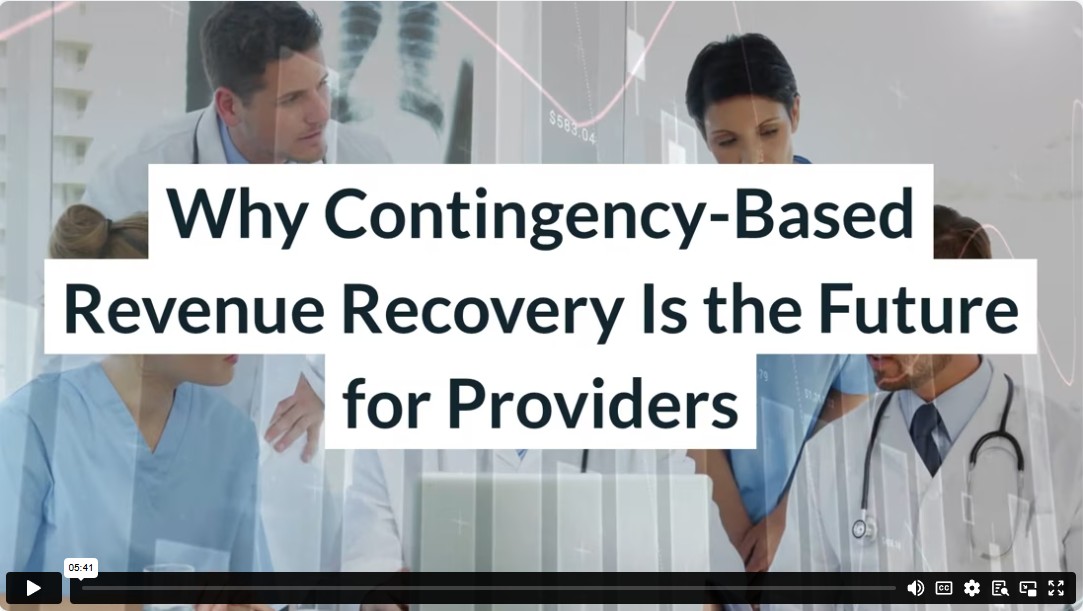When it comes to insurance underpayments, despite the saying, not everyone loves a gamble. As a healthcare provider, you know the annoyance of insurance underpayments all too well, but the costs and uncertainty in pursuing reimbursement just make it too much of a gamble.
That’s why contingency-based revenue recovery has become such a game-changer. Contingency-based NSA representation allows you to pursue the reimbursements you’re owed without paying upfront costs. Instead of paying filing fees or legal expenses out of pocket, you only share a portion of the recovered funds if the case is successful.
This option means you don’t have to take that risky bet in order to get paid. It’s a risk-free solution for maximizing revenue and allowing you to focus on what you do best: providing the best care for your patients.
Why Traditional Recovery Models Hold You Back
In the past, if you wanted to fight an underpayment or denial, you often had to choose between two costly paths:
- Allocating internal resources to handle arbitration, with staff scrambling to manage tight deadlines and complex filings
- Hiring legal support and paying hourly rates, regardless of whether you won or lost
Both options carried risks. Filing fees alone can add up, and the time your team spends on disputes takes away from other critical tasks. For many practices, this financial and administrative burden made arbitration feel like a gamble that wasn’t worth making. This system led you to write off claims rather than fight them.
But here’s the problem with that approach: it leaves up to millions of dollars on the table. You lose all that potential revenue that could have gone to hiring more staff or investing in state-of-the-art equipment.
How Contingency-Based Recovery Eliminates Risk
Contingency-based models flip the script. Instead of paying upfront costs, you work with an arbitration support team for hospitals. This team advances those expenses and manages the entire arbitration process. If the claim is successful, they receive a percentage of the recovery. If it isn’t, you pay nothing.
This approach eliminates the financial risk that has kept providers from pursuing fair reimbursements. By shifting the risk away from your organization, contingency-based recovery ensures that you never lose money by standing up for your right to be paid fairly.
Why This Model Favors Providers
So why has contingency-based recovery become so popular in the healthcare space? The answer is simple: it aligns perfectly with your priorities as a provider.
- No upfront costs: You don’t risk your own capital to pursue arbitration.
- Aligned incentives: Your recovery partner only gets paid if you do, so they’re motivated to maximize results.
- More consistent action: With the cost barrier removed, you can pursue every underpayment you would otherwise ignore, leading to more recovered revenue over time.
This approach creates a system where your financial interests are directly aligned with those of your recovery partner.
The Results Speak for Themselves
Providers who embrace contingency-based revenue recovery routinely see dramatic improvements in their financial outcomes. Arbitration under the No Surprises Act often results in providers recovering five to ten times more than the insurer’s initial payment. With a contingency model, you can benefit from those results without taking on the risk.
For hospitals and physician groups, this means turning previously written-off claims into meaningful revenue. For individual practices, it can make the difference between scraping by and thriving in a competitive healthcare environment.
The Hidden Benefits of Risk-Free Recovery
The most obvious benefit of contingency-based recovery is financial: you get paid without paying up front. But the advantages go deeper:
- Reduced administrative burden: Your staff no longer has to navigate complex arbitration filings, freeing them to focus on patient care and day-to-day operations.
- Greater financial predictability: Knowing you won’t lose money on disputes means you can build a more stable budget and plan for growth.
- Improved morale: Your team feels supported when they see underpayments being addressed without adding to their workload.
In short, contingency-based recovery protects your revenue and strengthens your entire organization.
Why It’s the Future of Provider Revenue Recovery
The healthcare landscape is changing rapidly. With rising costs and evolving payer strategies, providers can’t afford to keep leaving money uncollected. Traditional models that demand upfront investment or staff-heavy processes are no longer practical.
Contingency-based revenue recovery is the future because it reflects the realities you face today. You need solutions that reduce risk and ensure you get paid fairly. When you adopt this model, you protect your finances. And just as importantly, you build resilience for the challenges ahead.
Your Next Step as a Provider
If you’ve been accepting underpayments or writing off claims because arbitration feels too expensive or complicated, now is the time to rethink your approach. Shifting to a contingency-based model opens the door to revenue recovery without the risks that have held you back.
As a provider or executive, your responsibility is to protect the financial health of your organization. With contingency-based recovery, you can finally do that without gambling your own resources.
Risk-Free Recovery Empowers You
Insurance underpayments will always be part of the healthcare landscape, but how you respond to them is up to you. You don’t have to take a financial gamble or accept every insurance underpayment that comes your way. Instead, you can embrace contingency-based revenue recovery and reclaim control over your future.
The future of provider reimbursement isn’t about simply accepting losses. It’s about demanding fairness in a way that carries no risk to you. With contingency-based solutions, you can use your recovered revenue to invest in growth and ultimately focus on delivering the care your patients need
Video

